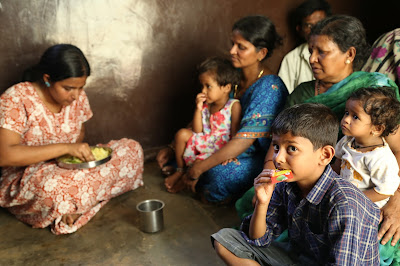Meet My Father, Anthony
 |
| My Father |
Hopes
of a good future for me were planted the day my father – Appa as I call him -- decided
to send me away to a boarding school called Shanti Bhavan. Despite my mother’s
ardent protests and pleadings that she would raise me on her own, even if it
meant begging on the streets, he was adamant that I study in a school that he
believed would offer me a brighter future. I don’t know how a man who hasn’t
had any formal education and had never seen professional success could foresee
and trust that an education could save me from the poverty-stricken life he and
his family had endured for generations.
Others
in my family say that my father wanted to get rid off me because I was born a
girl child, and hence he didn’t hesitate to give me up to strangers who came
looking for children to admit into their school. Upon my birth he had openly spoken about
throwing me into the nearby garbage pit.
Whatever
his reasons might have been, I am grateful that he had the wisdom to admit me
into Shanti Bhavan, a place that has been a home for me and for more than three
hundred other children for the past twenty years.
Before
I began writing my memoir, I hardly knew my father. I would respectfully greet
him “Namaste” each time he came to take me home for the holidays, and then I
would not see him for days. My maternal grandmother said he was busy brewing
liquor in the woods or chasing elephants in the surrounding forests, and in his
free time going after local women. Grandmother never liked him, and her
sarcastic remarks about him revealed her opinion that he was no good.
But as years
passed, I have learnt a lot more about my father, I now understand his way of
life. As a young boy he served as a bonded laborer in an upper caste landlord’s
house after my grandfather failed to repay the money he had borrowed from
the landlord.
During
his service at the landlord’s home, he endured what the caste system dictated. My
father and two other boys who worked along with him all hailed from the Christian
Dalit caste. They were not allowed to enter the kitchen, and were required to
wash their hands and feet before stepping into the house to avoid “contamination.”
They couldn’t use the plates or glasses that were set aside for the family. My
father endured the mistreatment and
discrimination with silent acceptance.
As a
teenager my father joined my grandfather’s family business of making local
liquor. My village, Thattaguppe, offered very limited job opportunities to the
poor. The working class were laborers on landlord’s fields or engaged in brewing
liquor. Appa evaded the police, trekking through the woods to sell the liquor
in other villages at night, and escaped getting crushed by wild elephants.
Appa is
hardly five feet tall, his teeth are crooked and uneven, and his eyes small and
red from drinking. He smiles shyly and his voice is usually subservivant. His
sun-baked skin and the hard ridges on his hands and cracked feet are the
surviving signs of a past marked by hardship. His humility is admirable, partly
formed by his constant attempt to please the rich and the upper caste.
The
title of my book, “The Elephant Chaser’s Daughter,” was inspired by my father.



Love this! What an amazing, vibrant truth you have. I'm curious to read the memoir.
ReplyDeleteXo
Crystal
Thank you Crystal!
Delete